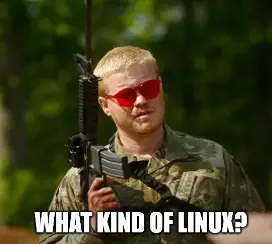The petition is open to all EU resident. The goal is to replace all Windows in all public institution in Europe with a sovereign GNU/Linux.
If the petition is successful it would be a huge step forward for GNU/Linux adoption.
I’ve always said governments and public institutions funded by taxpayers should use FLOSS and not be beholden to private companies. Any shortcomings or unfulfilled needs in Linux and FLOSS software would quickly be dealt with once large organizations like these started using it as the default, since they could easily fund whatever features or fixes are needed for significantly less money than they pay for proprietary software (especially now that these days they’re forking over annual subscriptions), and thus they’d also have much more control over the making sure the software meets their needs.
It seems like a no-brainer to me. Maybe it wasn’t in the earlier days of Linux but not for the last decade or so.
Total proprietary capitalist hellscape
Foss: "lol, we don’t need you, we have lin-
ENTER: new global Ai standards that depend on proprietary blobs that only work on nvidia hardware and Windows.
Foss: “w-we don’t need Ai.”
PLEASE UPDATE YOUR BROWSER TO USE-
Foss: “STOP IT!”
UNSUPPORTED
WE SEE YOUR PHONE
Foss: “you wouldn’t…”
UNSUPPORTED
This is an uphill battle in the face of corporate lobbying, learned fixedness, and, let’s face it, unintuitive UX that is found in some selection of FLOSS which is often absent in proprietary counterparts: something that people who are not tech savvy (tech-indifferent?) would prefer not to put up with.
However, I think the last problem can be mitigated with the right kind of focus and funding from such initiatives.
There have been many such initiatives[0][1] over the years in different countries where they eventually lose steam and fade away.
Also, is there an operating system backed or sponsored by EU that is actively maintained, analogous to BOSS[2] and Pardus[3]?
[0] https://en.m.wikipedia.org/wiki/Category:State-sponsored_Linux_distributions
[1] https://en.wikipedia.org/wiki/List_of_Linux_adopters
[2] https://en.wikipedia.org/wiki/Bharat_Operating_System_Solutions
[3] https://en.wikipedia.org/wiki/Pardus_(operating_system)
E: typo
I like and support the idea in general, but the petition’s scope is just too broad and lacks focus. Migrating to Linux? Sure, but let’s not force a single distribution across the EU. New EU mobile OS? Nice idea, but there is no solid alternative unless a lot of time and money is spent on developing it.

Adopting Linux is the best way to help ensure European sovereignty from maga meddling.
“I’d just like to interject for a moment…”
PSA: You can support this petition even if you’re not an EU resident
Is that So? How?
I just signed it, but I’m in eu
It lets you sign up as a country outside the EU and sign it
I mean I’d be fine with BSD too. the point should be to force public institutions to use FOSS
That would be incredibly dumb. There are entire fields where the FOSS is just hilariously behind proprietary software (or sometimes the only option). Do you want to cripple public institutions by cutting them off entirely from proprietary software?
I think the point is to invest the money into the continued development and improvement of the foss software instead of giving the money to businesses who shield their proprietary codebase. In theory.
“There are entire fields where the FOSS is just hilariously behind proprietary software”
- “hilariously”?
- Examples?
Switzerland already did it. Its brilliant. Instead of the gov pouring money into proprietary solutions to meet their needs, they can fund FOSS and benefit from the same software being funded by other governments and companies too.
Proprietary is crippling. Its only chosen due to corruption
Right now public institutions are paying for proprietary software. If they would invest the same money into FOSS, the FOSS option would not be behind proprietary software for long.
FreeBSD is fine for servers I guess, but due that most server administrators know Linux better than any BSD, it’s probably not going to be used much. BSD’s also seem to be severely underfunded and the future of them seem vague.
Sure but nobody is petitioning for BSD desktops in the EU
Sigh. Guess I’ll have to do it
Cope
You sound super nice.
If they can keep the MS lobbyists out, it’s feasible, just ask Munich.
Except they couldn’t keep the Micro$oft
criminalslobbyists out
Maybe it’s too early in the morning, anyone got a link, I couldn’t find any?
This is a link sharing platform. All posts are supposed to have a link to a news article. Its at the top.
The post does contain the link to the petition, anyway it’s this one: https://www.europarl.europa.eu/petitions/it/petition/content/0729%252F2024/html/Petition-No-0729%252F2024-by-N.-W.-%2528Austrian%2529-on-the-implementation-of-an-EU-Linux-operating-system-in-public-administrations-across-all-EU-countries
My main worry with Linux becoming more popular is that it will be attacked with more malware and viruses. I wouldn’t mind though if Linux programmers could come up with better protection.
Linux is a lot easier to secure
Linux-based OSes are less uniform than Windows. They could and probably will be targeted, but exploits won’t spread because of how many verities they are and how different and incompatible they can be. Some, for example, don’t even use the GNU utils and userland.
This petition is for developing something dubbed “EU-Linux”, so if implemented as is will be pretty uniform
That is mostly false. Most of the code that faces the network is the same. As is most of the background running code. Linux is still more secure.
Most of the Windows malware gets deployed by some user downloading and executing random files they downloaded on the web. Since installing applications on Linux is usually done through some centralized package manager or app store (Flathub), it almost entirely eliminates this attack vector. Running random scripts from the internet by downloading them using
curland piping them intosudo bashis a whole nother issue though. Noob-friendly distros like Ubuntu should IMO have some safeguards in place to block these actions.Since installing applications on Linux is usually done through some centralized package manager or app store (Flathub), it almost entirely eliminates this attack vector.
xz moment.
Yes, I see that weasel word “almost” in that sentence. I expect it’s going to be doing increasingly heavy lifting as Linux becomes a more lucrative target to attack over time.
Your point generally stands, though. Even if they’re fallible, at least someone is vetting it at all somewhere in this pipeline.
Linux is already what a decent chunk of servers run, so I don’t really see it increasing malware.
Well, severs don’t generally run Thunderbird and Firefox
The insecure parts of Linux is mostly on the DE side opposed to the core OS part that servers use. We absolutely will see more vulnerabilities in the future as Linux grows.
What vulnerabilities are you talking about? Linux is pretty solid especially with wayland and flatpaks.
Throw in some other tools like mandatory access controls and you are set
Any developments over the last few years have been for improving those aspects, e.g. Wayland is far more secure than X11 could ever be. There will be more vulnerabilities found, but it won’t be as bad as one might fear.
Flatpak too, they could force more filesystem restrictions tho, line Android apps
I feel like they don’t know the magnitude of that what means.
Very cool but unlikely to work
Could easily fork a distro and pay a government agency or independent entity the same amount as Microsoft is currently being paid to maintain the distro. Or they could put financial backing on any of the current commercial Linux solutions out there. It’s far from farfetched.
The problem is dealing with the application side.
Just one feature that’s massive - how many systems have automatic import/export using Excel file formats. Converting those processes will be a huge undertaking themselves, let alone how many other things that will require re-engineering. The scope and scale of this is staggering.
A better effort would be to convert a single, small organization in government, then the scope is limited, but you get to build the fundamentals, and gain the experience of interfacing with extant systems.
You realize the office alternatives have been able to save into native excel formats, even in various year varieties, for a long time, right?
And I suppose they work perfectly every single time?
Including the VBAs and Macros?
Most of the time they work better than the original.
VBAs and Macros
These are essentially malware vectors so I hope those are not supported.
Aren’t most government organizations interlinked?
Depends where you are. I can’t speculate on the EU or its member-states. But here in Canada, your information is basically stuck at an organization unless you give consent to have it sent somewhere else. And it gets even more complicated when it involves a provincial-federal relationship.
Why creating a new distro instead of using a big one and contribute to it?
Governments tend to have security standards that differ from most solutions readily available. Not saying this is the case, but it’s a possibility.
They aren’t building something from scratch. They probably are just going to make a base image with everything configured in a standard way.
Supported!














